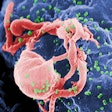
Researchers have found that policies that allow hospital bedside nurses to independently order testing for Clostridioides difficile (C. difficile) infections significantly expedited the availability of test results, as compared to policies requiring physician approval.
Their study, published Wednesday in the American Journal of Infection Control (AJIC), could decrease the risk of additional patient infections and the corresponding clinical and economic burden of C. difficile infections within hospitals.
C. difficile is a bacterium that can cause infection of the large intestine. Individuals with C. difficile infections can be asymptomatic or have symptoms ranging from mild diarrhea to severe, life-threatening colitis, or inflammation of the colon.
C. difficile is responsible for 223,000 healthcare-associated infections, resulting in more than 12,000 deaths and $6.3 billion in annual costs in the U.S. alone.
Despite various strategies to address infection prevention, C. difficile remains one of the most common hospital-acquired infections. Early detection, isolation and contact precautions, environmental cleaning, and appropriate antibiotic treatment can prevent the bacteria from spreading to other patients, greatly decreasing the rates of morbidity and mortality.
The clinical and economic impacts of C. difficile infection on both hospitals and patients create many incentives for improving approaches to the prevention and spread of this infection within the clinical environment.
At a site within the Veterans Affairs (VA) Healthcare System in Fargo, ND, infectious disease and nursing staff developed a policy change allowing nurses to independently order stool samples for new patients displaying C. difficile infection symptoms, rather than requiring a physician’s electronic signature. Researchers then evaluated the effectiveness of the new policy by comparing the frequency of tests being ordered, the time to obtain test results, the number of positive and negative tests, and the time to initiate treatment for positive C. difficile tests for the 44 months before and 59 months after the policy change.
The average difference in time to obtain the test result after the PCR lab order was statistically significant — 2.1 hours before the policy change versus 1.3 hours after the policy change. There was no significant difference in time needed to initiate treatment, which took 1.7 hours both before and after the policy change. The authors suggest this was because the process of notifying physicians to initiate antibiotic treatment remained unchanged; nurses did not receive test results directly, nor could they order antibiotics.
The researchers recommend consideration of similar policies by healthcare facilities in order to expedite appropriate C. difficile testing and speed up implementation of appropriate treatment and infection control measures.
“Our findings suggest that allowing bedside nurses with appropriate training to order C. diff testing based on patient symptomology could be a valid strategy to help healthcare systems achieve their goals,” Dr. Ashley Bartlett, lead author and a researcher at Fargo VA Healthcare System, said in a statement.













